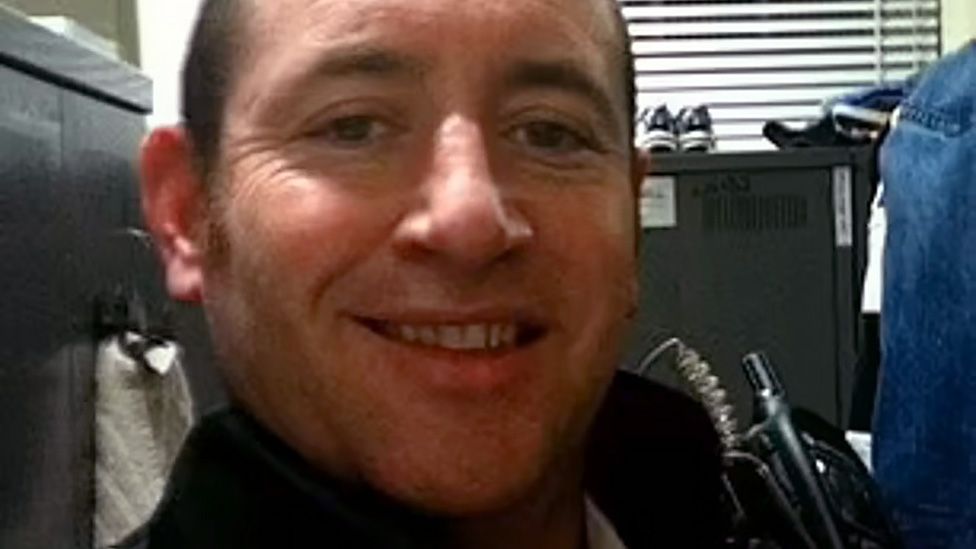Police forces ordered to check existing staff in same way they vet recruits
- Published

All police forces will be asked to check staff against national databases to identify if anyone "slipped through the net", the Home Office says.
It follows the case of David Carrick who admitted dozens of rape and sexual offences as a Met Police officer.
The National Police Chiefs Council (NPCC) will ask forces to check current staff recruited before tougher vetting of recruits was introduced in 2006.
The College of Policing will also be asked to strengthen vetting procedures.
Carrick, 48, was officially sacked on Tuesday after he pleaded guilty to 49 offences against 12 women over two decades.
Prime Minister Rishi Sunak said Carrick's crimes were an "absolutely despicable" abuse of power which needed to be "addressed immediately".
Speaking after a joint visit to a London police station with Met Police Commissioner Sir Mark Rowley, the prime minister said: "All police forces across the country have been told to check all of their serving officers and staff against national police databases to identify and root out anybody who shouldn't be serving.
"The government has done a huge amount already to protect the safety of women and girls, but we will keep going and doing whatever it takes to ensure that women and girls feel safe and can go about their lives, freely and without fear."
The NPCC, which works with police forces on staffing, says the checks will help identify "anyone who has slipped through the net".
Shadow Home Secretary Yvette Cooper described the move for tougher checks as the "bare minimum" and called the government's response "completely underwhelming".
"All we get are warm words from the home secretary and prime minister while in practice they have walked away from taking national action to improve police standards," she said.
This is just the latest call for tougher vetting checks in policing.
The current guidelines for checking applicants when they join a police force were set in 2006 and require a series of background checks that look at everything from past convictions, behaviour of family and friends, or financial problems that may leave an applicant open to corruption.
The College of Policing introduced the national guidelines to ensure all forces in England, Wales and Northern Ireland were checking new recruits in the same way.
Then in 2019 the police watchdog, Her Majesty's Inspectorate for Constabulary, Fire and Rescue Services, gave all forces in those three nations a deadline of July 2020 to retrospectively vet all their officers and staff to those 2006 guidelines, no matter how long they had been serving.
That deadline passed and in 2021, the BBC's File on Four programme checked with the forces whether it had been complied with - and revealed that a quarter had not met the deadline.
Now two-and-a-half years on from the deadline, it is not clear how many forces have still to complete the checks. The Home Office has yet to reveal how many background checks are missing at this stage, but has been approached by the BBC for a comment.
Police Scotland is not bound by College of Policing guidance but said it was "watching developments" and would consider taking action as a result of the Carrick case.
It comes as the Home Office also launched a review of the police disciplinary system to make sure officers who "are not fit to serve the public" and "fall short of the high standards expected of them" can be sacked.
Officials will look at decision-making at police disciplinary hearings, as well as checking forces have the power they need to take action against rogue officers. The review is expected to be completed within four months.
Home Secretary Suella Braverman said in a statement: "David Carrick's sickening crimes are a stain on the police and he should never have been allowed to remain as an officer for so long.
"We are taking immediate steps to ensure predatory individuals are not only rooted out of the force, but that vetting and standards are strengthened to ensure they cannot join the police in the first place."
Meanwhile, Carrick could be stripped of his state-funded pension, as the Home Office has said it will consider a minister's application for its forfeiture.
Have you been affected by the issues raised in this story? Share your experiences by emailing haveyoursay@bbc.co.uk.
Please include a contact number if you are willing to speak to a BBC journalist. You can also get in touch in the following ways:
- WhatsApp: +44 7756 165803
- Tweet: @BBC_HaveYourSay
- Upload pictures or video
- Please read our terms & conditions and privacy policy
If you are reading this page and can't see the form you will need to visit the mobile version of the BBC website to submit your question or comment or you can email us at HaveYourSay@bbc.co.uk. Please include your name, age and location with any submission.
Related Topics
- Published18 January 2023
- Published17 January 2023
- Published16 January 2023
- Published16 January 2023
- Published16 November 2021